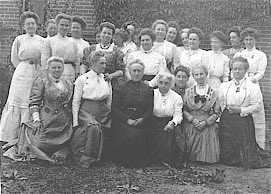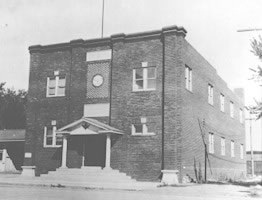Littleton Organizations
It didn't take the industrious pioneers of this part of the South Platte River valley long to organize. First settled in 1862, a mere ten years later Richard Little platted his land into the village of Littleton. That same year, local Masons received a charter from the Grand Lodge of Colorado for its own lodge. To be named the Weston Lodge, after Allyn Weston, the first Grand Master of Masons in Colorado and one of the founders of Central City, it was the 22nd Lodge in the Territory. The first meeting of Weston Lodge was held April 8, 1872, on the second floor of the general store owned by Julius Hill, at the intersection of Rapp St. and Bowles Ave.

Every Tuesday Reading Club. Date unknown.
The Masons continued to meet above the general store for many years, as did the town council in 1890-1, the Methodists, Catholics, Christian Scientists and Odd Fellows, as well as innumerable dances -- for years it was the largest room in town. The Masons moved to their own Lodge on August 20, 1921. An Arapahoe Chapter of the Order of De Molay for boys was begun in 1925, followed in 1929 with an Order of Rainbow for Girls.
In January, 1872, the Farmer's Club of Littleton was formed; Richard Little served as the secretary of the club and he, as well as other members, advocated for the passage of laws requiring railroads to fence their property or pay for the stock that might be killed crossing railroad tracks. This club existed for only a few years.
The Littleton Athletic Club was organized on December 18, 1896 with seventeen charter members; Frank R. Caley was elected president of the club. The Littleton Athletic Club continued on for several years in connection with sports of various kinds which included bicycle racing, boxing, baseball and other activities.
The next organization to receive wide mention in newspapers and affect the daily lives of Littletonites was the Littleton Women's Club, which was founded in 1897. The Ladies met monthly to explore ways of improving the community. In 1901, with excess funds from the volunteer Hose Co. #1, they were responsible for the formation of the town's first library, and the driving force behind the Library Association for years. They held numerous fund raisers, and one of note was a baseball game in 1905 between prominent gentlemen in town, divided between the married men and the bachelors. Spectators paid 25 cents to view the July 4th match, and officials were authorized to fine those in attendance for "offences" as varied as "opening an umbrella", "running too slow", "getting out" and "getting a hit". One gentleman, after being fined 25 cents at different times for "standing up" and "sitting down", left in a huff. Even the mayor, caught sitting on a water wagon, contributed a dollar to the library fund, which raised $90.
In 1905, local farmers formed the Breene Ave. Grange, although most referred to it as the Columbine Grange, a name formalized in 1914. Among their early activities was the purchase and operation in 1918 of what became known as the Columbine Mill and formation of the Columbine Mercantile Co., an idea that was just then sweeping the country -- co-ops for farmers. Grange #151 also petitioned the town of Englewood to install protective hitching posts, as automobiles were taking up all the room in front of stores.
The ladies kept the lead in community service in 1910 by forming a local chapter of the Mothers' Congress, to keep an eye on health and nutrition in public schools. In 1916 the name was changed to the Parent Teachers' Association (PTA).

Masonic Temple on Rapp Street, 1922.
The town's first gentlemen's service organization began in 1922. Edwin Bemis and twenty others applied to Rotary International for a charter, but didn't really expect a favorable reply. Rotary was still known as a "big city" organization then. To their surprise, charter number 1282 was granted, and Littleton became the first in a wave of "little towns" to be so-honored. The Women's Christian Temperance Union was active in town, but Littleton held out until Congress officially put the country on the wagon in 1920.
Other associations for the benefit of the community came in rapid succession, including: American Legion (1920), the Optimists (1926), Boy Scout Troops #111 (1928) and #112 (1929), Royal Neighbors of America (1930), Junior Chamber of Commerce (1931), Hol-Sum Home Demonstration Club (1932), Young America (athletic) League with its Littleton Alligators (1933), the Littleton Business and Professional Women's Club (1934), Littleton Red Cross (1942), Elks Lodge (1942), and the Veterans of Foreign Wars (1945).
One other organization, one which cast its shadow across Littleton in the 1920s, was the Ku Klux Klan. In 1922, borrowing the new techniques of the advertising age, the Klan "went public", so to speak, sending 2,000 recruiters across the country spreading their now discredited message of white nationalism. They signed up anyone with an axe to grind with corrupt government and real or imagined enemies among their neighbors, and who had $10. Membership swelled to a reported 4,000,000 nationwide, with some 20,000 in the Denver metro area. The hook locally was corrupt cops and bootlegging; crosses were burned in the yards of two white Littleton couples who were living together but not married. A mass initiation of 1,000 members was held atop South Table Mountain in Golden, with a sixty foot tall cross burning that was visible for 100 miles. Klan members were elected mayor of Denver, Colorado Senator and Colorado Governor in the late 1920s. But the reign was short, as Klan electees and appointees had not a clue as to how to run government, and soon found themselves caught in the same, and worse, corrupting traps as those they replaced. By 1930, the Klan virtually ceased to exist in Colorado and in most of the nation.
Bibliography
Bemis, Edwin A. Historical Notes. Littleton, Colorado. Date unknown.
Hicks, Dave. Littleton From the Beginning. Denver: Egan Printing , 1975.
Littleton Independent. Littleton Independent Publishers, 1888- .
Littleton Independent. The Story of Littleton, Denver's Best Suburb, Golden Jubilee Number, July 22, 1938. Littleton: Littleton Independent Publishers, 1938.
Littleton Independent. Sixtieth Anniversary Edition, 1888-1948. Littleton: Littleton Independent Publishers, 1948.
Littleton Museum. Photographic Archives.
____. Vertical File: "Organizations".
McQuarie, Robert J. and C.W. Buchholtz. Littleton, Colorado: Settlement to Centennial. Littleton: Littleton Historical Museum and Friends of the Library and Museum, 1990.
Photographs courtesy of the Littleton Museum, unless otherwise noted; to order copies, contact the Museum at 303-795-3950.
Compiled by Pat Massengill
Updated May 2021 by Phyllis Larison